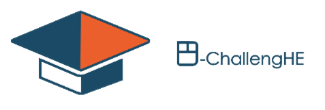

This Guide is developed within the WP5 of the Erasmus+ project ”Digital Challenge in Higher Education” (2022-1-IT02-KA220-HED-000087029).
Chapter 1 Digital technologies in education – An overview
1.5. Developing digital competences through the whole curriculum
1.5. Developing digital competences through the whole curriculum
The integration of digital skills into various academic disciplines has become a crucial aspect of modern education. Incorporating digital skills into every subject area ensures that all students can develop the necessary competencies required to thrive in a technology-driven society, addressing the growing consensus among educators that institutions must prioritize digital literacy as a core aspect of the educational experience.
According to many studies, the integration of digital skills into various disciplines fosters nowadays a deeper understanding of content, allowing students to engage interactively with knowledge, develop critical thinking abilities, and become better prepared to meet the challenges of the times when digital literacy is anticipated to be an indispensable asset (Bhat, 2023; Khan, 2018; Nguyen & Habók, 2023).
The benefits of embedding digital skills across the curriculum are multifaceted and far-reaching. They include enhanced collaboration opportunities through digital platforms, which enable students to connect with peers globally, enrich their learning experiences, and cultivate a diverse worldview, thus preparing them for the interconnected nature of today's job market (Bhat, 2023). Moreover, by leveraging technology as a critical component of their education, students not only develop proficiency with digital tools but also cultivate essential skills such as adaptability and the capacity for lifelong learning, which are vital in a rapidly changing environment where digital competency is increasingly linked to academic achievement and career success (Nguyen & Habók, 2023). This shift towards digital literacy enhances problem-solving capabilities, encouraging students to engage collaboratively and creatively, which are vital components in addressing real-world challenges effectively. Furthermore, the emphasis on digital thinking within education cultivates essential competencies that transcend traditional learning methods, pushing students to become creators of knowledge rather than mere consumers.
On the other hand, the proliferation of technologies in the educational realm has ushered in a new era, one where the boundaries of the traditional classroom have been transcended, allowing students to access educational resources from virtually anywhere, thereby revolutionizing the learning process (Jurs & Bethere, 2020) and the expectations from the teaching staff. The concept of the "digital classroom" has emerged, empowering students to engage with content in interactive and personalized ways, fostering a more dynamic learning experience. Digital transformation has not only enhanced the potential of educational situations, but has also streamlined administrative tasks, communication, and record-keeping, ultimately improving the overall efficiency of the educational process.
Equally important, the implementation of digital tools creates a more inclusive learning environment by accommodating diverse learning styles and needs, thereby fostering greater accessibility and engagement among students with varying abilities and backgrounds, which is essential for ensuring that no learner is left behind in the digital age (Khan, 2018; Bhat, 2023; Jurs & Bethere, 2020; Nguyen & Habók, 2023). Incorporating technology into the curriculum facilitates inclusivity and accessibility, allowing diverse learners, including those with disabilities, to participate fully in their education while fostering a habit of lifelong learning (Tinmaz et al., 2022; Bhat, 2023; Srivastava, 2023; Sentriyo et al., 2023), as students increasingly rely on digital tools to seek out new information and develop their skills.
As the integration of digital skills across the curriculum becomes a pressing necessity, it is essential to recognize and address the potential challenges that may arise. One key concern is ensuring that teachers of all subjects possess the requisite digital literacy to effectively model and guide students in the use of technology as an intellectual tool. Addressing this challenge requires a strategic investment in professional development programs that equip educators with the knowledge, skills, and confidence to efficiently incorporate digital tools and resources into their teaching practices (Jurs & Bethere, 2020; Nguyen & Habók, 2023). The evolving nature of technology necessitates ongoing training for educators to enhance their competencies, as successful integration hinges on their ability to inspire students and demonstrate the practical applications of digital skills within various disciplines, thus fostering an environment where students can thrive academically and develop the necessary digital proficiencies to navigate the complexities of the 21st century (Nguyen & Habók, 2023; Jurs & Bethere, 2020; Srivastava, 2023; Bhat, 2023). Considering this, education must prioritize not only the acquisition of technological resources, but also the simultaneous development of digital literacy among both teachers and students, thereby ensuring that the hybrid teaching and learning environments effectively facilitate academic achievement and prepare students for the demands of the digital age. It is crucial then to recognize that the successful incorporation of digital skills is contingent upon students' access to quality digital educational content and resources.
» Provide feedback for this chapter: https://forms.gle/tNyWC1HYMsP46t6WA
« Get back to main page: digital-pedagogy.eu/Guidelines
An open access guide. A perfectible product, for an evolving reality.
You can use the form available on this page to provide feedback and/ or suggestions.
For social annotations on any chapter, you can use Hypothesis or any other similar tool.
You can also send direct feedback to: olimpius.istrate@iEdu.ro | +40 722 458 000
Guidelines for online and blended learning
Available online: https://digital-pedagogy.eu/Guidelines
Full pdf version to download: Guidelines (version 6)
The Romanian partner in D-ChallengHE project in charge with WP5 is
the Institute for Education (Bucharest): https://iEdu.ro
Contact: office@iEdu.ro